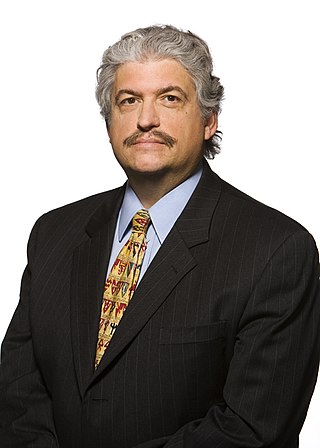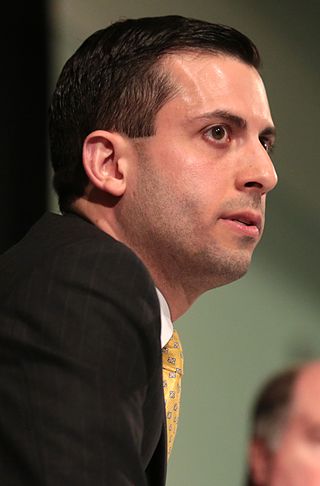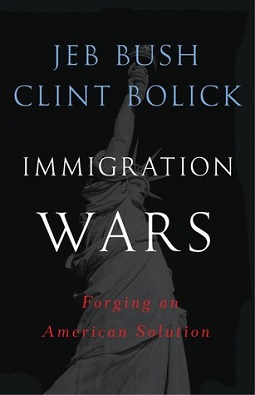
Immigration to the United States has been a major source of population growth and cultural change throughout much of its history. In absolute numbers, the United States has by far the highest number of immigrants in the world, with 50,661,149 people as of 2019. This represents 19.1% of the 244 million international migrants worldwide, and 14.4% of the United States' population. In 2018, there were almost 90 million immigrants and U.S.-born children of immigrants in the United States, accounting for 28% of the overall U.S. population.

Vietnamese Americans are Americans of Vietnamese ancestry. They comprise approximately half of all overseas Vietnamese and are the fourth-largest Asian American ethnic group following Chinese Americans, Indian Americans, and Filipino Americans. There are approximately 2.3 million people of Vietnamese descent residing in the U.S. as of 2023.
The H-1B is a visa in the United States under the Immigration and Nationality Act, section 101(a)(15)(H), that allows U.S. employers to employ foreign workers in specialty occupations. A specialty occupation requires the application of specialized knowledge and a bachelor's degree or the equivalent of work experience. The duration of stay is three years, extendable to six years, after which the visa holder can reapply. Laws limit the number of H-1B visas that are issued each year. There exist congressionally mandated caps limiting the number of H-1B visas that can be issued each fiscal year, which is 65,000 visas, and an additional 20,000 set aside for those graduating with master’s degrees or higher from a U.S. college or university. An employer must sponsor individuals for the visa. USCIS estimates there are 583,420 foreign nationals on H-1B visas as of September 30, 2019. The number of issued H-1B visas have quadrupled since the first year these visas were issued in 1991. There were 206,002 initial and continuing H-1B visas issued in 2022.
Anchor baby is a term used to refer to a child born to non-citizen parents in a country that has birthright citizenship which will therefore help the parents and other family members gain legal residency. In the U.S., the term is generally used as a derogatory reference to the supposed role of the child, who automatically qualifies as an American citizen under jus soli and the rights guaranteed in the Fourteenth Amendment to the U.S. Constitution. The term is also often used in the context of the debate over illegal immigration to the United States. A similar term, "passport baby", has been used in Canada for children born through so-called "maternity" or "birth tourism".

The Immigration Reform and Control Act was passed by the 99th United States Congress and signed into law by U.S. President Ronald Reagan on November 6, 1986.

Immigration reduction refers to a government and social policy in the United States that advocates a reduction in the amount of immigration allowed into the country. Steps advocated for reducing the numbers of immigrants include advocating stronger action to prevent illegal entry and illegal migration, and reductions in non-immigrant temporary work visas. Some advocate tightening the requirements for legal immigration requirements to reduce numbers or move the proportions of legal immigrants away from those on family reunification programs to skills-based criteria.

The Federation for American Immigration Reform (FAIR) is a nonprofit, anti-immigration organization in the United States. The group publishes position papers, organizes events, and runs campaigns in order to advocate for changes in U.S. immigration policy. The Southern Poverty Law Center classifies FAIR as a hate group with ties to white supremacist groups.
Reforming the immigration policy of the United States is a subject of political discourse and contention. Immigration has played an essential part in American history, as except for the Native Americans, everyone in the United States is descended from people who migrated to the United States. Some claim that the United States maintains the world's most liberal immigration policy.

According to the 2021 Canadian census, immigrants in Canada number 8.3 million persons and make up approximately 23 percent of Canada's total population. This represents the eighth-largest immigrant population in the world, while the proportion represents one of the highest ratios for industrialized Western countries.

Immigration is the international movement of people to a destination country of which they are not usual residents or where they do not possess nationality in order to settle as permanent residents. Commuters, tourists, and other short-term stays in a destination country do not fall under the definition of immigration or migration; seasonal labour immigration is sometimes included, however.

Robert E. Rector is a research fellow at The Heritage Foundation focused on poverty issues. Rector has written over 300 reports, articles, and commentaries on public policy and has testified before Congress more than 40 times. His writings include the book America's Failed $5.4 Trillion War on Poverty.
During the 18th and most of the 19th centuries, the United States had limited regulation of immigration and naturalization at a national level. Under a mostly prevailing "open border" policy, immigration was generally welcomed, although citizenship was limited to “white persons” as of 1790, and naturalization subject to five year residency requirement as of 1802. Passports and visas were not required for entry to America, rules and procedures for arriving immigrants were determined by local ports of entry or state laws, and processes for naturalization were determined by local county courts.
Israeli Americans are Americans who are of full or partial Israeli descent. In this category are those who are Israelis through nationality and/or citizenship. Reflecting Israel's demographics, while the vast majority of the Israeli American populace is Jewish, it is also made up of various ethnic and religious minorities; most notably the ethnic Arab minority, which includes Christians, Druzes, and Muslims, as well as the smaller non-Arab minority ethnic groups.

The United States government holds tens of thousands of immigrants in detention under the control of Customs and Border Protection and the Immigration and Customs Enforcement (ICE).

Alexander Nowrasteh is an American analyst of immigration policy currently working at the Cato Institute, a libertarian think tank located in Washington D.C. Nowrasteh is an advocate of freer migration to the United States. He previously worked as the immigration policy analyst at the Competitive Enterprise Institute, another libertarian think tank. Nowrasteh is a self-described "radical" advocate for open borders to and from the United States. He has published a number of peer-reviewed studies on immigration and co-authored with Benjamin Powell the book Wretched Refuse?: The Political Economy of Immigration and Institutions.

Immigration Wars: Forging an American Solution is a 2013 non-fiction book about immigration in the United States co-written by Jeb Bush, who served as the governor of Florida from 1999 to 2007, and Clint Bolick, who serves as the vice president of litigation at the Goldwater Institute in Phoenix, Arizona.
The We Belong Together Campaign is anchored by the National Domestic Workers Alliance, the Asian Pacific American Women's Forum and other groups throughout the United States. We Belong Together is an initiative that is in the United States, that spreads awareness of immigration laws that impact women and immigration reform. It was formed in 2010 to address issues concerning the female immigrant population in the United States. The campaign offers a gender-basedanalysis and focuses on maintaining nuclear families.
Federal policy oversees and regulates immigration to the United States and citizenship of the United States. The United States Congress has authority over immigration policy in the United States, and it delegates enforcement to the Department of Homeland Security. Historically, the United States went through a period of loose immigration policy in the early-19th century followed by a period of strict immigration policy in the late-19th and early-20th centuries. Policy areas related to the immigration process include visa policy, asylum policy, and naturalization policy. Policy areas related to illegal immigration include deferral policy and removal policy.
Joe Biden's immigration policy initially focused on reversing many of the immigration policies of the previous Trump administration, before implementing stricter enforcement mechanisms later in his first term.
Immigration to the United States has many effects on the culture and politics of the United States.









